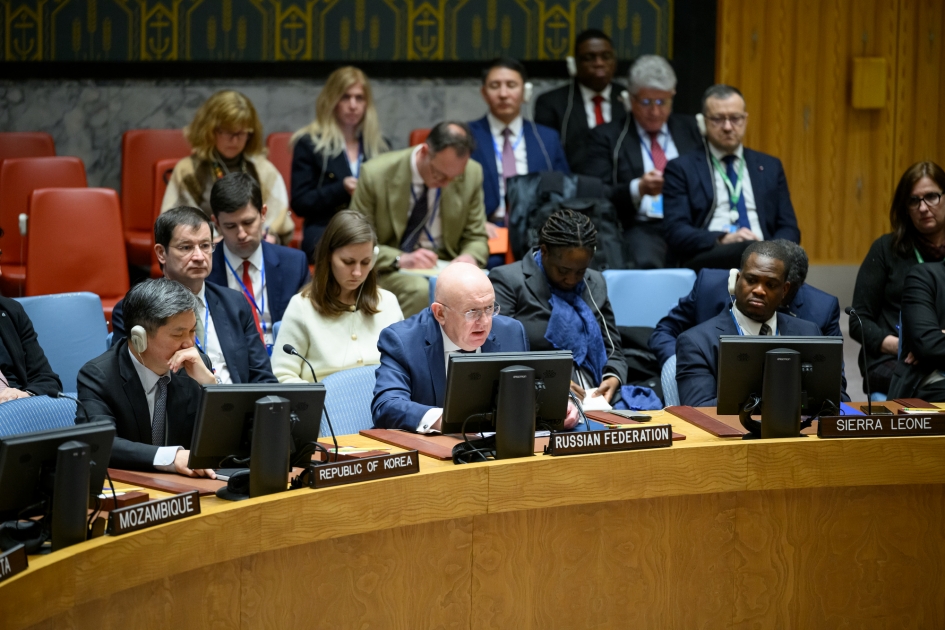Statement by Permanent Representative Vassily Nebenzia at the UN Security Council with regard to the 25th anniversary of NATO aggression against Yugoslavia
Mme.President,
I regret the decisions that you made today.
We called a meeting in connection with the 25th anniversary of the NATO aggression against sovereign Yugoslavia, the consequences of which continue to influence the degradation of the situation in the Balkans. Contrary to the cynical statements of our Western colleagues, this is not a "historical" issue at all. The situation in Kosovo remains on the agenda of the UN Security Council and is being actively discussed. It is well known that lately, the situation there deteriorated dramatically. In order to understand how to establish lasting peace on Serbian soil, it is necessary to talk about the true causes of the current escalation.
On March 24, 1999, a US-led coalition of countries of "defensive alliance" invaded the Federal Republic of Yugoslavia on the pretext of stopping the ethnic cleansing allegedly taking place in Kosovo. In reality, the Yugoslav army and police were fighting an exhausting battle against Kosovo Albanian terrorist gangs in the province. The infamous Kosovo Liberation Army (KLA), whose leaders are now on trial in The Hague, ruthlessly massacred the Serb and disloyal Albanian population. However, Western propaganda turned the KLA thugs into freedom-loving rebels and warriors of the good, and the legitimate authorities of Yugoslavia, who defended constitutional order, into war criminals. Cynical provocations were organized to demonize the Serbs.
NATO’s aggression against a sovereign country lasted 78 days and resulted in unimaginable suffering, numerous victims and catastrophic devastation for its population. That is what NATO members who are also members of the Security Council and are present now ion this Chamber did not want to hear.
The aggression against Yugoslavia was a flagrant violation of international law: the fundamental purposes and principles of the UN Charter, the Helsinki Final Act of the CSCE, and the norms and principles of international humanitarian law. The reputation of the UN Security Council, which did not authorize the Alliance's forceful actions against Yugoslavia, was seriously undermined. The Council simply had to face fait accompli.
Since the beginning of the blood-stained collapse of the Socialist Federal Republic of Yugoslavia, orchestrated and sponsored by the United States, Germany and others, and the attack on Yugoslavia, the Alliance has undermined the established security architecture that had ensured peace in Europe for many decades. This is the signature destructive manner of the North Atlantic Alliance.
The attack on Yugoslavia launched a series of large-scale aggressions by the United States and its allies around the world: against Iraq, Libya, Afghanistan, Syria. Everyone knows what they led to. The anti-constitutional coup in Kiev in 2014 also tracks its roots back there.
Some Security Council colleagues would probably say that the events of 25 years ago are "history" and have no relevance today. However, it is clear to any reasonable mind that the destruction of a sovereign state led to the chaos that is gaining momentum today, and not only in Kosovo but in the Balkans as a whole. That is what we were going to discuss at today's meeting. I think you agree that this matters for the work of the Security Council, which adopted resolution 1244.
Mme.President,
Since the representative of France argued today that the fact of this meeting being scheduled in advance by the Presidency is invalid, we will be forced (since we cannot trust written communications from the Presidency anymore) to insist that the agenda for each meeting of the Security Council be approved by procedural vote. Let us call this established precedent the "de Rivière clause".
Thank you.
